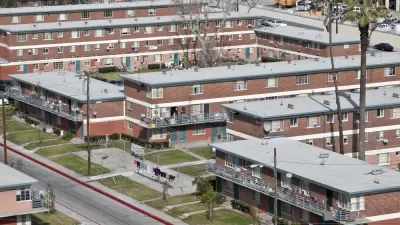Richard Moe, longtime president of the National Trust for Historic Preservation, has announced his retirement. His tenure brought about a major change in the way the group interacts with the federal government to preserve the nation's historic sites.
"When Moe came to the trust in 1993, it had an annual budget of $29.2 million, a substantial portion of which came from the federal government. After watching the organization's time and resources consumed in regular battles to preserve that money -- Tom DeLay led a failed effort to zero out the trust's appropriation in 1995 -- Moe decided to wean his group from federal support. It was a bold move, and it signaled a larger cultural change.
'We are now much more creative, much more entrepreneurial,' says Moe, who broke the news officially to his staff Tuesday afternoon. Despite the loss of $7 million in annual government funding, the trust's budget grew, to $55 million, and Moe spearheaded two capital campaigns that saw the trust's endowment rise from $33 million to $232 million at the height of the economic boom in 2007."
FULL STORY: National Trust's chief retiring

Maui's Vacation Rental Debate Turns Ugly
Verbal attacks, misinformation campaigns and fistfights plague a high-stakes debate to convert thousands of vacation rentals into long-term housing.

Planetizen Federal Action Tracker
A weekly monitor of how Trump’s orders and actions are impacting planners and planning in America.

In Urban Planning, AI Prompting Could be the New Design Thinking
Creativity has long been key to great urban design. What if we see AI as our new creative partner?

King County Supportive Housing Program Offers Hope for Unhoused Residents
The county is taking a ‘Housing First’ approach that prioritizes getting people into housing, then offering wraparound supportive services.

Researchers Use AI to Get Clearer Picture of US Housing
Analysts are using artificial intelligence to supercharge their research by allowing them to comb through data faster. Though these AI tools can be error prone, they save time and housing researchers are optimistic about the future.

Making Shared Micromobility More Inclusive
Cities and shared mobility system operators can do more to include people with disabilities in planning and operations, per a new report.
Urban Design for Planners 1: Software Tools
This six-course series explores essential urban design concepts using open source software and equips planners with the tools they need to participate fully in the urban design process.
Planning for Universal Design
Learn the tools for implementing Universal Design in planning regulations.
planning NEXT
Appalachian Highlands Housing Partners
Mpact (founded as Rail~Volution)
City of Camden Redevelopment Agency
City of Astoria
City of Portland
City of Laramie





























